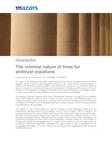
The criminal nature of fines for antitrust violations
As a result of the disagreements publicly expressed by several cement companies that were fined for allegedly having incurred in anti-competitive practices, in the sense that the Superintendency of Industry and Commerce ignored evidence that proved their innocence, an interesting debate is gaining momentum in Colombia that has been taking place in Europe about the nature of fines for violation of free competition and about the standard of proof that must be given in this type of cases, in order to guarantee the right of defense and due process of those investigated.
This debate is important because of the size of the penalties imposed in Europe for anti-competitive acts, which, although limited to 10% of annual turnover, can have a considerable impact on a company's finances. Such is the case, for example, of the recent fine imposed by the EU Commission on Google for 2.4 billion Euros for allegedly favoring, in its search engine, its online shopping service to the detriment of its competitors.
The debate on the criminal nature of fines for violation of free competition arises from the jurisprudence recently issued by the European Court of Human Rights ("ECHR") based on the European Convention on Human Rights (Article 6 of which enshrines the right to a fair trial), which, although not yet part of the European Union legislation, has inspired the European Courts to set the threshold of protection that the European Union Commission must guarantee when investigating and sanctioning companies for acts contrary to free competition. Likewise, Article 47 of the Charter of Fundamental Rights recently adopted by the European Union, which as a human rights treaty has immediate constitutional application, replicates to a large extent the right of participants to be investigated and judged, in a timely manner, by an impartial and independent entity previously established by law.
Although Article 23(5) of Regulation 1-2003 of the Council of the European Union explicitly states that fines for violation of free competition shall not be criminal but administrative in nature, the jurisprudence of the ECHR, as well as several members of the Luxembourg Courts, have established the contrary. Thus, in the case Menarini Diagnostics S.R.L. vs. Italy, after the defendant was fined for violation of free competition and its claim before the Italian courts failed because the latter did not have full jurisdiction to interpret the factual and legal grounds applicable to the case (since the Court could only review the arguments on the nullity of the administrative measure adopted), it turned to the ECHR, which stated that the proceedings against Menarini had a "criminal nature" for the purposes of the provisions of Article 6 of the European Convention on Human Rights.
The ECHR concluded this on the basis of; (i) the classification of the violation according to the national legislation and the protected legal right protected by the norm, (ii) the nature of the infraction and (iii) the nature and severity of the penalty applied.
The effect of the classification of the sanction as criminal is not irrelevant, nor is it simply academic; it determines the level of constitutional protection that must be given to those under investigation in the course of the process and determines that the evidentiary standard that must guide the investigation is the standard of "beyond a reasonable doubt". In this sense, it is not enough that the competition authority gathers evidence and, with this evidence, proceeds to sanction, but, in order for a sanctioning resolution to be issued, there cannot be any doubt about the participation of the investigated party in the sanctionable conduct. This also implies that the burden of proof is reversed and it is no longer up to the person under investigation to prove his innocence, but to the competent authority to prove the occurrence of such innocence.
This jurisprudential development can be directly applied to the Colombian case, since the systems of investigation of competition infringements are practically identical and the international human rights conventions to which Colombia is a party extend them to legal persons, and not only to natural persons. In the same sense, the Colombian Constitutional Court, in its unification decision SU 182/1998 and in decision T-415/1999, established that legal persons are holders of certain fundamental rights, such as due process, the right to defense, the presumption of innocence, among others.


